Talk Show 4 with T Cooper, Lisa Selin Davis, Ellen Litman, Elissa Schappell, and Amanda Eyre Ward
01.11.07
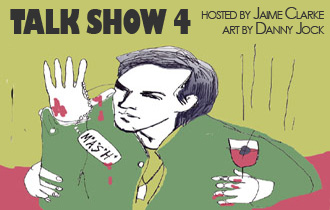 TALK SHOW
TALK SHOW
Hosted by Jaime Clarke
Topic: Childhood Hero
Guests:
T Cooper is the author of the novels Lipshitz Six, or Two Angry Blondes, and Some of the Parts, as well as co-editor of an anthology entitled A Fictional History of the United States with Huge Chunks Missing. T lives in New York City and enjoys monkeys, dogs, and ferrets. Visit T at: www.t-cooper.com.
Lisa Selin Davis is the author of Belly, a novel, and has written about the environment, architecture, real estate and film (and lots of other things) for the New York Times, House & Garden, Paper, Salon.com and many other publications. She lives in Brooklyn. Visit Lisa at: www.lisaselindavis.com.
Ellen Litman is the author of The Last Chicken in America: A Novel in Stories. Her fiction won first prize in the Atlantic Monthly 2003 Fiction Contest, and she’s been awarded 2006 Rona Jaffe Foundation Writers’ Award, as well as fiction fellowships at the University of Wisconsin-Madison and the Fine Arts Center in Provincetown and scholarships to the Bread Loaf Writers’ Conference. Her stories have appeared or are forthcoming in Best New American Voices 2007, Best of Tin House, Ontario Review, Triquarterly, Ploughshares, and elsewhere. She is now an Assistant Professor and the Associate Director of Creative Writing at the University of Connecticut. Visit Ellen at: www.ellenlitman.com.
Elissa Schappell is the author of the story collection Use Me, which was a finalist for the PEN Hemingway award, and co-editor with Jenny Offill of the essay anthologies, The Friend Who Got Away and Money Changes Everything. She is a contributing editor at Vanity Fair, a founding editor and now editor-at-large of Tin House, formerly senior editor of The Paris Review, and a frequent contributor to The New York Times Book Review. Her essays and stories have appeared in such publications as The KGB Bar Reader, BOMB, SPIN, The Bitch in the House, The Mrs. Dalloway Reader and the forthcoming anthology of sex writing, Do Me.
Amanda Eyre Ward was born in New York City, and graduated from Williams College and the University of Montana. Amanda’s first novel, Sleep Toward Heaven, was optioned by Sandra Bullock and Fox Searchlight. Her second novel, How to Be Lost, was chosen as a Target Bookmarked pick and has been published in 15 countries. Amanda’s new novel, Forgive Me, is set in South Africa and on Nantucket. She lives in Austin, Texas with her husband and two sons. Visit her at: www.amandaward.com.
––When and how did you first discover him/her?
Cooper: My first awareness of television as a small child involved M*A*S*H, (well, also The Electric Company, but there were, to be sure, no childhood heroes to be adopted from that show). I was born one month after the M*A*S*H television pilot went on the air in September 1972, and I would say that my deep, abiding love for Benjamin Franklin “Hawkeye” Pierce, developed somewhere during the program’s fifth or sixth season. I watched the show religiously, both through the two-and-a-half hour series finale in 1983, and in re-runs throughout my high school and college years. (To this day—in addition to owning every season on DVD—I will pretty much always stop and watch an episode on the Hallmark Channel or TV Land whenever I’m flipping through the channels and see it on. And as much as I appreciate all of the characters, the writing, the politics—pretty much everything about that show—it always has been and always will be about Hawkeye for me.)
Davis: The first childhood hero I recall is Wonder Woman—not the 2D comic version but Linda Carter with her tremendous cleavage and strong thighs: so powerful, and yet wearing a tiara! I’m not sure where I saw her, since we were a TV-free household until I entered third grade. But I loved her in that little girl, secular crush kind of way. When I think about it now, those kick-ass chicks––Charlie’s Angels, Bionic Woman––were a thousand times more compelling than the painted and catty women on, say, Dynasty or Dallas. Although I supposed I was interested in them, too. All that mauve blush! That blue eye shadow! For a hippie kid, it was fascinating stuff.
Litman: It was sometime in the spring/summer of 1983. I was nine, finishing second grade. She was a year older – delicate, pretty, with long brown hair and that crackling smile everyone was so crazy about. She looked good in any clothes. She looked good with pigtails and in a forage cap of Young Pioneers. Most importantly, she was American. Her name was Samantha Smith and that spring she was all over the Soviet papers and also on TV. In case you don’t remember (and most people don’t anymore), she was the girl who wrote the letter to the Soviet Secretary General (Andropov), something along the lines of “why do you Russians want to kill us Americans?”––though, of course, she put it much more elegantly. Now, like all normal Soviet children, I was under the impression that it was the other way around, that Americans were the evil imperialists who exploited the poor and threatened the world with a bomb. So clearly, this Samantha girl was confused. Andropov must have thought so too, because he invited Samantha to visit Mother-Russia and see for herself how peaceful and fair Soviet people were.
Schappell: I discovered Katharine Hepburn when I was ten or eleven. My mother and sister and I were visiting my grandparents, and I couldn’t sleep, so I went into the room where my mother was sleeping, and crawled into bed with her. She was watching The Philadelphia Story. I wasn’t allowed to watch much television, and certainly not in bed, so it was all very exciting for me. About five minutes in I thought, “I want to be her.” She was so unlike any other actress I’d ever seen. She was so funny, but unlike the “funny” actresses I knew like Goldie Hawn or TV-personality Susanne Somers, she was witty, and sharp. While she could be daft and goofy, she was never stupid. She was making the joke, or in on the joke, but she herself was never the joke. In movies like The Philadelphia Story and Bringing Up Baby, which required her to do physical comedy (and always she did her own pratfalls because she said her stunt doubles could never capture her carriage) she was in control. And unlike other funny women Gilda Radner, Madeline Kahn, Cloris Leachman she was beautiful. With her red hair and killer accent (I was always working on an accent of some sort) she wasn’t like any one else I knew.
Ward: When I was in junior high, I saw a cool girl at the mall wearing a FREE MANDELA T-shirt. I just wanted the shirt. I thought some of this girl’s magic might rub off on me if I could just dress like her. I was a nerd in beaded barrettes and parachute pants. The striped legwarmers didn’t get me a second glance, so I pinned my hopes on the shirt. It was red. Some of the cool girls at school shopped in the Village (the East Village of NYC…we lived in the suburbs). I figured I had to get to the Antique Boutique, and then I could buy a FREE MANDELA shirt and get a metal button that showed I had been to The City. I went on a mission with my cousin, but we got lost. We ended up in Chinatown and it got dark and we took a cab back to her apartment and the cab fare cost all my babysitting money. I read about Mandela instead.
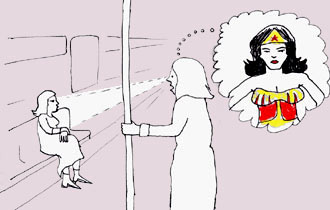 ––How did you try to emulate him/her?
––How did you try to emulate him/her?
Cooper: When I really started understanding the political mission of M*A*S*H, I tried to learn everything about the Vietnam War, because at one point I think I heard an adult talking about how the TV show was really a commentary on Vietnam… It was years until it clicked that it was in fact set during the Korean War, so then I tried to learn about that particular war, (I mean, “police action”). In addition to all of this, in school I tried to make Hawkeye-like wisecracks as often as possible, and I think I can credit him with teaching me what sarcasm is. (That is, assuming that I do in fact know what sarcasm is.) I also remember going to the Army-Navy supply store and getting an green hat from the Korean War era and wearing it as much as possible.
Davis: Always, there was a question when it came to these buxom and brave women I admired: did I want to be them, or, I don’t know, have them somehow. Was emulation the goal? In my early meekness and shyness (both of which I’ve largely shed), I wouldn’t have been able to imagine myself lassoing a criminal, whisking him off in my invisible plane. I don’t think I wanted her powers. I wanted her romance. I wanted to be admired and feared, maybe. And beautiful. And rich. And bejeweled. And loved. I don’t think I felt much of any of that in my childhood, save for occasionally loved (the best of the bunch, of course). I wanted Steve to love me.
Litman: In the youth magazine Pioneer, Samantha Smith was photographed sitting on the steps of her parents’ house in Maine. She was dressed in a turtleneck and a pair of jeans. They way I remember it, the house was on the edge of some fields, and there was maybe a dog nearby––Samantha’s dog. The accompanying article revealed that she wanted to become a veterinary doctor. Unlike her, I had no turtlenecks, no jeans, no dog, no steps to sit on, and no idea what I wanted to be when I grew up. In short, I lacked direction. That summer, while Samantha traveled through Russia and visited the best summer camp in the country (Artek), I languished at the dacha we rented every year. While she was doing press conferences and fighting for world peace, I was learning the multiplication table. And while she swam in the Black Sea, I waited for the weather to improve enough so that I could splash for five minutes in a nearby lake. But not all was lost. At Artek, Samantha befriended a Russian girl who could speak English. This gave me an idea. I whined and begged, and in the fall my parents signed me up for private English lessons. Within a few months, I could do a little speech, which I demonstrated repeatedly to all our relatives and friends. It sounded something like this: I have a big family. I have a mother. I have a father. I have a sister. I have a grandfather. I have two grandmothers. It wasn’t much, but then again, I didn’t think Samantha could speak much Russian either.
Schappell: Well, at first I tried to mimic her accent, but failed miserably. It did occur to me at some point––perhaps seeing her on a talk show––that she would think it very lame that I was trying to be her, when what I admired about her was her insistence on being so fully herself, and never apologizing for it. I aspired to the sort of bantering she shared with co-stars like Spencer Tracy in Woman of the Year, and Cary Grant in everything they ever did together. I tried to style my own flirtatious interactions with boys after her. From the way she wrinkled her nose, to her way she slapped the faces of men who offended her. And she did get offended a lot. A few years ago a small cabal of unhappy under-published writers and “anarchists” tried to disrupt a reading I was a part of. When they started heckling I started to panic, then I thought, “What would Kate do?” What I came up with was, Well she wouldn’t back down. She wouldn’t whine or complain. She wouldn’t look to someone else to fight her fight. She would compose herself, lift her chin, and while appearing 100 percent a lady defend herself with slashes of humor, and colorful language. I felt my backbone stiffen, I gripped the podium, ordered a martini, down it, and delivered a few choice words. I didn’t do nearly as well as she would have, but I did my best.
Ward: I asked my mom why there were no blacks at the golf club, and for that matter, why there were no Jews. (I didn’t know about Hispanics; we didn’t have them in suburban New York and we didn’t have tacos either.) She told me life was complicated, so I sulked around the tennis courts, feeling morally superior.
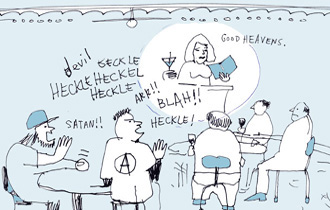 ––Did you friends share your hero worship?
––Did you friends share your hero worship?
Cooper: I don’t think anybody understood my worship, nor my quest for M*A*S*H action figures in lieu of the requisite Star Wars figures and spaceships that everybody else coveted. I have no idea what happened to all of my M*A*S*H action figures, but a few years ago I remember winning a Hawkeye figure on eBay, but I don’t know where it is, and actually, this whole discussion reminds me that I need to locate that thing and put it on my desk where I can see it every day for inspiration and to remind me to try not to lose my sense of humor.
Davis: What little girl did not love Wonder Woman? Even her name, the invocation of wonder, which is sadly such a childhood phenomenon—think how many people lose their sense of wonder as they age. But, no, I can’t remember bonding with any little girls over WW. Perhaps, more likely, little boys.
Litman: I didn’t have many friends at that age. There was one who lived on the other side of Moscow (she went to a special English school and kind of looked like Samantha) and another who lived in Ukraine. I can’t remember for sure, but I think they must have liked her. How could they not? That girl was everywhere. There was some talk among adults that it was her parents who wrote the letter, that she was maybe a CIA agent, and wasn’t it altogether too convenient that she turned out to be so perfect and pretty, like a paid advertisement for America? But what did they know!
Schappell: Heavens no. They didn’t understand why I’d be enamored of an actress that they only knew from later movies like On Golden Pond. If I’d told them how I admired her outspokenness and ability to articulate herself when she was angry, the way she got up in peoples’ faces and challenged them–calling them on their hypocrisy like in, Guess Who’s Coming to Dinner? they’d have shaken their heads in complete wonder, in part no doubt because I’d have been inarticulately raging in a bad Bryn accent.
Ward: No. Most of my classmates worshipped a girl in tenth grade because she had appeared in a tampon commercial.
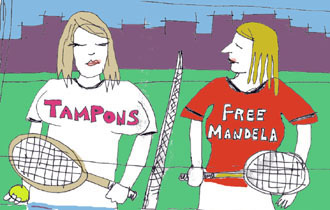 ––Ever get a chance to meet/communicate with your hero?
––Ever get a chance to meet/communicate with your hero?
Cooper: At a Jewish Book Council event in Washington D.C. a couple years back, I did meet Alan Alda’s wife Arlene, who writes children’s books and was there, like me, pitching her book and her services as a speaker to Jewish book fairs across the country. I introduced myself and briefly considered telling her how much I love her husband and his politics and his creativity and also that I’d recently read and enjoyed his memoir Never Have Your Dog Stuffed and Other Things I’ve Learned, and how I think it was really cool that he came out so publicly in favor of the ERA way back when, even though he took so much shit for it. But in the end I decided simply to shake her hand and look her directly in the eye and try to wordlessly communicate my respect for her and her husband in a more dignified (well, sane), manner.
Davis: Once, I saw a woman on the subway who looked so much like her. Actually, I saw her twice, and stared and stared. I know Linda Carter wouldn’t ride the subway. No, no contact. I don’t even think I wrote her any fan mail. I did, however, watch a TV movie with her and Loni Anderson, where they both were spies or something, sometime in the late 80s. Now that’s loyalty.
Litman: At the end of the summer, Samantha went home. She changed her mind about being a veterinary doctor and decided to become an actress instead. It proved to be a fateful decision. A couple years later she was killed in a small-plane crash, while returning from filming some silly TV show. Some people in Russia said it was CIA’s work. Far-fetched? Probably. I suppose I could’ve written her a letter in those two or three years between her visit and her death. But I was never the type to write fan letters. Besides, what could I have written back then? I am a schoolgirl. I am ten. I have a big family.
Schappell: No. Though I did find out a few years ago that a friend of mine’s sister had worked for her until she died. She was her companion, she ran errands for her, and took her for drives. She said Kate really loved tooling around in her sister’s beat up little Toyota, and that she kept her wits, sense of humor and independence until the end.
Ward: Not yet! My obsession with Mandela grows. I went to Cape Town last year to research my novel set in South Africa, and asked everyone I could find what they thought of him. I’ve watched dozens of documentaries about him and read countless books. All ironic detachment aside, I think he is an inspiration. I cannot imagine an American leader who even compares.
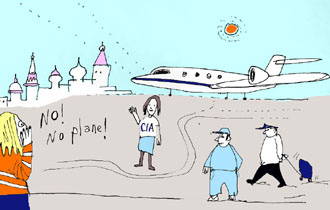 ––If you could say something to him/her now, what would it be?
––If you could say something to him/her now, what would it be?
Cooper: I think I kind of already tried to say something to him a few times in recent years… On page 241 of my first novel, a “fictional character” goes on and on about how handsome and generally excellent Alan Alda is, and shortly after the book came out in 2002, I might’ve sent a copy of it to him through his agent in New York. (No, I didn’t hear back, and further didn’t even get a signed photo in return. But it’s okay, because in Never Have Your Dog Stuffed and Other Things I’ve Learned, I found out that around the time my book would’ve arrived, Alda had been going through a life altering, near-death experience with a mechanical intestinal obstruction while shooting Scientific American Frontiers in Chile, and shortly thereafter decided to go on anti-depressants. So it was a hectic time for the guy.) Furthermore, M*A*S*H is also mentioned in a short story of mine that appeared in a recent issue of The New Yorker, and secretly, I’ve been thinking that out of all of the publications out there, I think of Alan Alda as someone who probably has a subscription to and reads The New Yorker regularly, so I’ve been quietly hoping that he by chance came across my story and saw the reference, and that a letter to me is on its way through my agent right this very moment. It could happen. And when it does, I’ll totally be sending him a signed photo in return.
Davis: I suppose I’m curious to know if she felt she was furthering the feminist cause somehow. She and her TV powerful/beautiful sisters: were they busting doors down for the next generation, allowing us the freedom to be strong, tough, calm in all weathers? Or were they saying: you have to do everything men do, and as well, but wearing makeup and heels (like the Ginger Rogers quote)? Maybe that was the beginning of the superwoman phenomenon (perhaps we should have called it Wonder Woman phenomenon), whereby you were “free” to have both families and careers, but slowly women have been finding that it’s a hell of a lot of work to have both. Most of still want to be powerful and domestic. I haven’t figured out how.
Litman: If I could go back in time? Maybe I’d say, Hey, Samantha, I’ve been living in America for fifteen years now, and this whole TV business is totally insipid, you know? You’re better off treating sick animals. Though, let’s face, the girl was photogenic as hell and clearly meant for public life. So who am I kidding? Maybe instead I could tell her how it would end – not the plane crash, but the whole Soviet saga, the Cold War, and everything that would follow. On the other hand, that’s a lot to tell, and I tend to get self-conscious and tongue-tied, especially around people of importance. Maybe I could just tell her not to get on that plane.
Schappell: Oh Kate, you were yar. And you were right, “If you obey all the rules you miss all the fun.”
Ward: Nelson, who was your childhood hero?